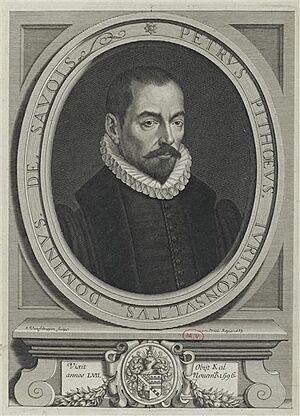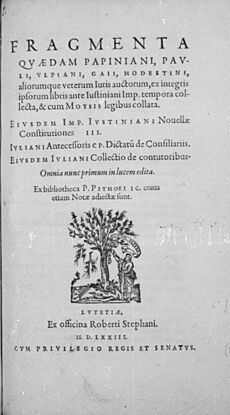Pierre Pithou facts for kids
Pierre Pithou (born November 1, 1539 – died November 1, 1596) was a very smart French lawyer and scholar. He was also known by his Latin name, Petrus Pithoeus. He wrote many important books and helped publish old texts.
Contents
Life of Pierre Pithou
Pierre Pithou was born in a town called Troyes, France. From a young age, he loved to read and learn. His father, also named Pierre, really encouraged this interest.
Early Career and Challenges
In 1560, young Pithou became a lawyer in Paris. When a religious war started in 1567, Pithou, who was a Calvinist (a type of Protestant), left Paris. He went to Sedan, France and then to Basel. He came back to France when the war ended.
Soon after, he traveled to England with a French leader, the duc de Montmorency. Pithou returned to France just before a terrible event called the massacre of St Bartholomew. He was very lucky to escape with his life. The next year, he changed his religion from Protestant to Catholic. The future Henry IV of France also did this.
Working for the King
When Henry became king, he saw how talented Pithou was. He gave Pithou many important jobs in the law. Pithou also helped publish a famous book called the Satire Ménippée in 1593. This book helped to weaken a group called the Catholic League. Many people believe Pithou wrote a big part of this book.
Important Writings and Editions
Pithou wrote many books about law and history. He also helped publish old writings by ancient authors. His first book was Adversariorum subsectorum lib. II. in 1565.
In 1569, he was the first to publish a book called Historia Romana. It later became known as Historia Miscella. One of his most important history books was his edition of the Leges Visigothorum (1579). This book was about the laws of the Visigoths, an ancient people.
He also edited the Capitula in 1588. These were laws from famous kings like Charlemagne, Louis the Pious, and Charles the Bald. He helped his brother François with a big book about church law called Corpus juris canonici (1687).
Pierre Pithou's book Libertés de l'église gallicane (1594) was about the freedoms of the French church. It was later reprinted in a collection of his works. He was also the first person to publish the Fables of Phaedrus (1596). These are famous stories with morals.
Pierre Pithou died in Nogent-sur-Seine. His amazing library, which had many old handwritten books, was mostly moved to the Bibliothèque Nationale in Paris. This is now a very important library.
Family
Pierre Pithou had three brothers who were also famous lawyers. Nicolas and his twin, Jean, wrote a book together about Christian marriage. François Pithou, the youngest brother, wrote books about law and church rules.
Works
Here are some of the books Pierre Pithou wrote or helped publish:
- Charlemagne empereur d'Occident (Charlemagne, Emperor of the West)
- Généalogie des comtes héréditaires de Troyes et de Meaulx, ou de Champaigne et Brie, qui furent aussi Roys de Navarre (Genealogy of the Counts of Troyes and Meaulx, who were also Kings of Navarre)
- Bref recueil des évêques de Troyes. (Signé : P. Pithoeus... [1572].). (Short collection of the Bishops of Troyes)
- Satire Ménippée, 1593.
- Satyre Ménippée : de la vertu du Catholicon d'Espagne et de la tenue des estats de Paris, Éd. Charles Labitte, Œuvres & Valsery, Ressouvenances, 1841; 1997 ISBN: 978-2-90442-973-6.
- Satyre Menippee de la Vertu du Catholicon d'Espagne et de la tenue des Estats de Paris, éd. critique de Martial Martin, Paris, H. Champion, 2007, « Textes de la Renaissance », n° 117, ISBN: 978-2-74531-484-0.
 | Victor J. Glover |
 | Yvonne Cagle |
 | Jeanette Epps |
 | Bernard A. Harris Jr. |



